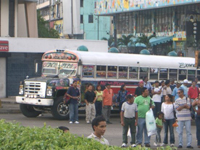
Thanks to its proximity to the Pacific coast and rugged mountains, the region encompassing the area from Chame to Anton has experienced tremendous economic and urban growth. Hundreds of nationals and foreigners have settled permanently in this region. Coronado, the first resort project in Panama, was established many years ago in Chame along a beautiful beach of the Pacific. Today, in addition to Coronado, a large number of new residential projects are scattered throughout the region. This major development is evident in the opening of modern shopping malls, numerous restaurants of varied foods, and branches of well-known Panamanian companies.
The demand for labor has increased in the areas of construction, gardening, domestic service, customer service, waiters and more. Much of this work force is native to the region; others have migrated from different areas of the country in search of better job opportunities. This article aims to explore a little bit more of the lives of those people who work in our houses or wait on us in restaurants and stores. With this purpose in mind, I interviewed several people with different jobs.
Mrs. Cristina, who is 60, has lived in Las Lajas her whole life and has worked as a maid in Coronado for more than 35 years. Her husband has worked as a gardener longer than that. She tells me that when she started working, Coronado was a pretty small village with very few houses. There were no buses so most of the time the workers had to walk or bike to get to their jobs. "Now it's easier.” she said. “We have buses from early morning until 7:30 at night.” According to Cristina, when she began working, she earned $3 for cleaning. Later the amount increased to $5, and now a maid can be earning $15 to $20 depending on what she does. "In the time I have been working in Coronado, I have had good and not so good bosses. Some of them were able to appreciate the effort and dedication I put into my work. I was treated with respect and affection, and I learned to gain their respect and trust. But despite the good and bad things, I do not complain. Through my work and my husband’s work we could raise a family of five children. Perhaps we could not provide everything they wanted, but they were never lacking for protection, care and education.” Today Mrs. Cristina and Mr. Vincent are retired, but they are still working, and doing their best. "Retirement payment is not enough to live on. Life is harder every day. Together we receive less than $400 a month. You can't do so much with that. We prefer to continue working as long as God gives us health and strength to go on,” says Mrs. Cristina.
Massiel Navarro, only 22 years old, has over nine years working at a Coronado restaurant. "I began at age thirteen,” she says. “I dropped out of school after finishing the sixth year. My aunt worked in that restaurant. She helped me to work there. Eventually, through my work, I saved enough money to built part of my house and raise my son. My husband abandoned us when I was three months pregnant. Every day I wake up at 6:30 in the morning to go to work, because it is difficult to get the bus, and I have to take care of my 5 year old child. I love my job and I also love attending people. The experience has taught me how to satisfy even the most demanding customers. I currently earn $280 per month, not much, but the tips are sometimes good. My husband is a butcher at Rey Supermarket, and along with his salary, we manage to take care of our family, my 5 year old son and the unborn baby.”
Ramón Aguilar, a 42-year-old resident in the community of El Cope, San Carlos, has worked as a gardener at a commercial plaza for more than two years. He started working when he was 16, first as a hired hand on a farm and then for 6 months in construction. Ramon is married and has three boys, who are 11, 15 and 18 years old. In his current work Ramón earns a salary of $260 per month. His eldest son, who is also currently working, did not finish school because he had to drop out to help his family with expenses. The two younger ones are still studying. One of Ramón’s biggest desires is to see his two youngest sons develop careers and become professionals in order to have easier lives than the one he has had to live. Ramón says that although he has had to work really hard, he has been happy in all his jobs and has always tried to do his best.
Such is life for a large number of Panamanians. But despite how difficult life has been for them, they always have the desire to succeed based on a great motivation: their families. On one occasion an EXPAT resident asked me how it was possible that Panamanians do not know their own country. The answer is simple. With low salaries, low wages, staples over $280 a month, plus water, electricity and other services bills, most poor Panamanians barely have the money to live decent lives. To travel, even inside Panama, is a luxury they can't afford.

